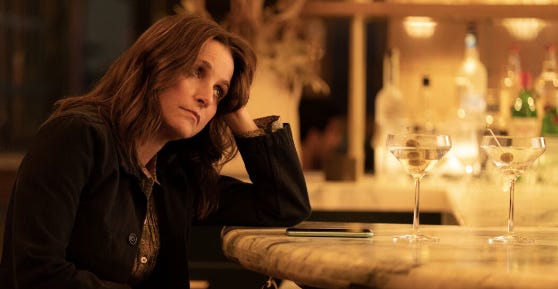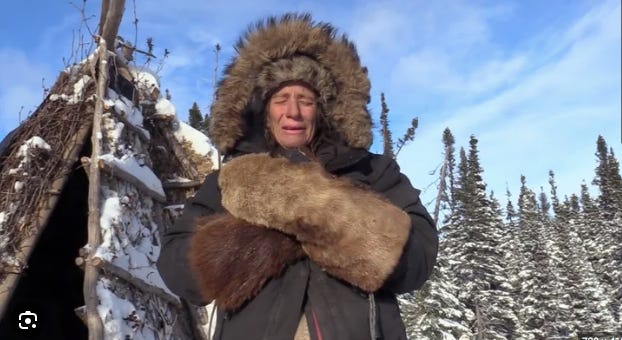I’ve been thinking about launching this Substack for a while, mostly because I liked the title I came up with. Then the Julia Louis-Dreyfus/Nicole Holofcener joint with a nearly identical title came out. That didn’t hurt my feelings, per se. How could I be mad at Nicole Holofcener? That my completely average brain shared a creative thought with hers was actually comforting. But it did feel like the universe was telling me to scrap the idea. “It’s been done!” The universe screamed at my earnest and tryful face. “You’re basic, bitch!” The universe may be a lot of things, but Glennon Doyle it is not.
Then this week, I was at a bar (because I drink to feel human) talking to some friends (who I secretly fear hate me) and the conversation found its way to discussing the state of our careers. We are all television writers, currently on strike, so you’d think we could all just say ‘bad, next topic…’ and order another drink. You’d think this would be the one safe space, the one safe moment, to find respite from the constant guilt I feel over not doing enough to secure a future for myself and my children. You poor naive fool. There are no safe spaces.
The thing about the strike is, we’re doing it because our profession is fucked. Writers rooms have gotten smaller and the amount of weeks they last is shorter; breaks between seasons have gotten longer. Writing has never been the most stable profession, but because of hard-fought protections by writers who came before us, you could make a living. You weren’t always working, but good years paid for bad ones. You could be a writer, and not have to be a million other things at the same time to keep your head above water. We say we are striking to try to prevent the gigification of our profession. But in a lot of ways, that’s already happened. With this strike, we are trying to claw our way back to writing as a career, not just a passionate project we sometimes get paid for.
And now let me get back to my self-loathing. That’s why we’re here, right? At the bar that night, I lamented to my friends about how creatively empty my life feels since the strike began, how days that were once thinly legitimized by meetings with producers and phone calls with my agents have been laid bare in their aimlessness. It’s like someone ripped a towel off of me, but instead of being naked, I’m pointless. I picket to get lots of steps. I feel exhausted. I wander around my house looking for good selfie light, then waste a few brain cells wishing I looked like I did ten years ago, then try to appreciate my current face for the sake of the withered hag I’ll be ten years from now. I pick up my kids from daycare and feel complete joy at seeing the freckles on my older son’s nose, the dimple on my younger son’s left cheek, the reciprocal joy I see in their expressions from how intersected we three are, how recently we all lived in the same body. Then halfway down the block I start counting down the hours til their bedtime.
So I shared this with my friends, assuming we were all bored and miserable and wanted to whine about it. But the moment I spilled my heart and half of my Negroni, I realized I’d made a terrible mistake. The narrative podcast one friend mentioned writing an hour earlier. The play the other described chipping away a couple of rounds ago. I was having a real Keyser Soze moment. (We can still make that reference, right? Why must a good reference suffer because so many innocent young men did?) See, my friends aren’t taking selfies all day. They aren’t white knuckling it til their kids go to bed. They don’t even have kids, dimpled, freckled, or otherwise, and you know why? Because they’re too goddamn busy! They’ve already adapted to the bottomlessness of our industry. Their days aren’t empty because they’re doing things to shield themselves against perils of the empty bank account. They host podcasts, write newsletters, teach classes, do stand-up, make short films. These two, and so many other writers I talk to on the picket line, find a way. They endure, so that on top of all those side hustles they can keep doing what they love. That’s what I mean when I say the gigification of our profession has already happened.
To be a writer, to weather the constant rejection and survive on the scant opportunity, you must be scrappy, resilient, and adaptable. It’s like being on Alone, except you don’t have to build your own house out of twigs… yet. But I have not been those things. Why haven’t I? Did I get too comfortable early on in my career because of a stroke of luck? Did that make me weak and soft? Or is weakness and softness in my DNA? It’s a real nature vs nurture toss up. Am I alone (also like Alone)? Or do we all blame ourselves for struggling to adapt to the increasingly sisyphean circumstances of making a living in this industry? All I know is how I feel, and I feel that, while so many people around me are enduring, I am not. I feel very bad for not enduring, and the ‘feeling bad’ part takes up so much of my time that I don’t have any left for the actual doing.
But I didn’t want to look totally pathetic in front of my fellow writers — once you get loser stink on you, you’ll never get a job — so I mentioned this newsletter idea that I definitely couldn’t do anymore because Nicole Holofcener made a movie about something completely different with a similar title. But if I could — which again, through no fault of my own, was now impossible— I’d planned, every week, to write about some recent event that hurt my feelings, (though it would be hard to pick just one), and tried to extract some greater meaning. Could anything more universal be gleaned from the self-defeating spinnings of a walking, talking, gaping wound? My female friend gushed over the premise. My male friend said nothing. And guess what? That hurt my feelings.
What was this asshole’s problem? Couldn’t he just pretend to like the idea to be polite? We work in Hollywood, we pretend to like our friends’ terrible ideas every day! Was ‘pretending’ exactly what my female friend was doing? Or was this typical man too emotionally stillborn to recognize the genius of my idea? Or were neither of them really even listening, because people who know me already realize I have nothing interesting to say? I was hurt. I was confused. I was paranoid. I was angry.
Another close personal friend of mine (my therapist) says that everything we do, we do because it is serving us in some way, even the bad stuff. Feeling bad about how we’re afraid people see us is totally exhausting, and not even the kind of exhausting that burns calories. But it does prevent us from taking risks, which staves off the pain of rejection, or making something and knowing it’s bad and also knowing that you’re not talented enough to make it any better. And blaming yourself for you lack of success at least gives you a sense of agency, instead of feeling like a pawn of a system you are infintesimally too small to change. Of course, “fear of failure” and “crippled by late stage capitalism” don’t seem like particularly groundbreaking results of taking emotional inventory. And yet, somehow they feel revelatory, not because I’m saying something new but because I’ve never been the one to say it.
What choice do I have but to try anyway? Especially after some random guy shit all over my idea by saying nothing? So I’m going to write this newsletter, using insecurity as my muse, and see if doing something, anything, even if it’s bad, actually feels better than doing nothing. Join me, won’t you? Please? If not, it will hurt my feelings! And a special thanks to that dick, now dead to me, for being so lukewarm about this idea. It was exactly the rejection I needed.







Love it/you Hallie! Will be following.
wow!